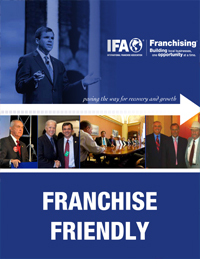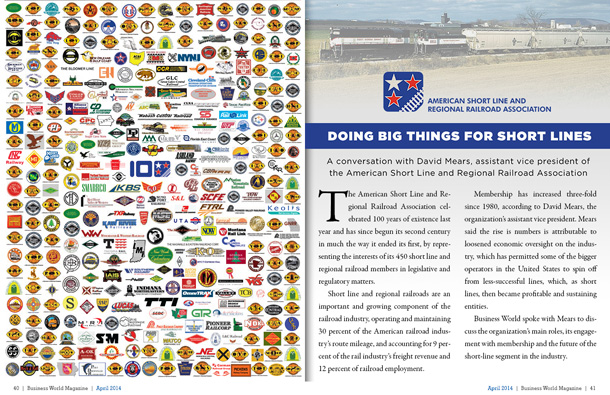

The International Franchise Association (IFA) is a Washington, D.C.-based trade group and non-profit association representing more than 1,200 franchisor members, 13,000 franchisees and 650 firms that supply goods and services to the franchising industry.
Founded in 1960, it is the world’s oldest and largest organization representing franchising.
Head of Communications Matt Haller joined the IFA two years ago. He previously worked for different trade associations in a communications role, and when an opportunity presented itself for him to join IFA, he took it.
IFA’s mission is to protect, enhance and promote franchising through government relations, public relations and educational programs.  “We want to be to the go to source for anyone thinking about getting into franchising or is in franchising now and needs help,†Haller says.
Advocacy first
The most valuable service the IFA provides to members comes down to advocacy and protecting the business model of franchising from being “tinkered with,†Haller says.
Secondary services include education and networking. The association offers a series of educational events, online classes, webinars, an annual convention, and a Certified Franchise Executives program (CFE) – a designation that shows an executive has been certified to the highest standards of quality training and professionalism.
“Anybody that receives the CFE designation agrees to uphold the Code of Conduct of the IFA,†Haller says. “You can use it as a selling point within your brand.â€
The IFA works closely with state, federal, local and international governments. They educate the government on the creation of jobs from franchising in their local communities and how different policies – whether it’s taxes, health care or workforce policies – impact IFA members.
“We work to advocate advances in those policies, and work to remove policies that provides too much regulation from our perspective on the business environment of franchising,†he says.
Their Government Relations Department achieves this by monitoring legislative and regulatory activity, conducting lobbying and grassroots campaigns, participating in national and local coalitions, creating forums and educational tools for experts in the franchising community, and promoting positive relations between franchisors, franchisees, and elected and appointed government officials and employees.
Their relationship with the federal government has been less than helpful recently, however, mainly due to tax rates and franchisors’ inability to start-up at flexible rates. There is an uncertainty surrounding tax rates because they will increase at the end of 2012 if U.S. Congress doesn’t act, Haller explains. “It’s creating a lot of apprehension from perspective investors and existing business owners about hiring more workers or expanding their business for next year and the years ahead,†he says.
On the other side of the coin, a government policy the IFA was successful in influencing was the Small Business Jobs Act that was passed into law in 2010. They lobbied for higher loan limits and higher loan guarantees as part of the bill. One of the IFA members even attended the bill signing at the White House.  “It increased the loan limits and loan guarantees in the programs that are used by a great number of new franchise business owners,†Haller says.
Another area IFA worked aggressively on pertained to the current “Bush-era†tax rate that was extended by President Obama at the end of 2010 – both corporate and individual tax rates, Haller says. “Those are the same rates set to expire again at the end of 2012,†he says.  “We’re hoping that Congress and the President will sign that into law so that our members get some more relief for an extended period of time.â€
Undue burdens
A policy issue posing a challenge for the IFA is the Affordable Care Act, which is not supported by the organization. Members were hopeful that the U.S. Supreme Court was going to declare it unconstitutional, but the law was passed and now they are dealing with the repercussions.
Haller says the bill has created a regulatory environment where many IFA members are trying to figure out how to comply with the act’s mandates while remaining profitable. “These mandates place what we think are undue burdens on the franchisees to provide coverage,†he says.
As a result, 3.2 million jobs in the franchise sector are at risk because of the act, Haller adds. “Our messages were heard loud and clear, but the administration is passing a lot of the costs of this law onto the backs of franchise business owners.â€
Expanding into the future
As for the future of international franchising, more than 70 per cent of their members have operations overseas or plan to operate overseas in the next five years. International growth is a primary focus, not only for their established brands, but also for their emerging brands nationally.
“That’s a growing area, particularly in the developing world,†Haller says. “Asia, Australia, New Zealand and South America are hotbeds for franchising.â€
Since franchising is still a relatively new business model, “the sky’s the limit,†he says, with respect to the longer-term future of the IFA.  The number of different franchises using the business model to grow in scale is only increasing, and the IFA’s view is that trend can only continue going forward.
“The franchise model has only been around for around 50 years. The future looks bright if the business environment is conducive to our entrepreneurs having the freedom to grow and sell franchises,†he concludes.








